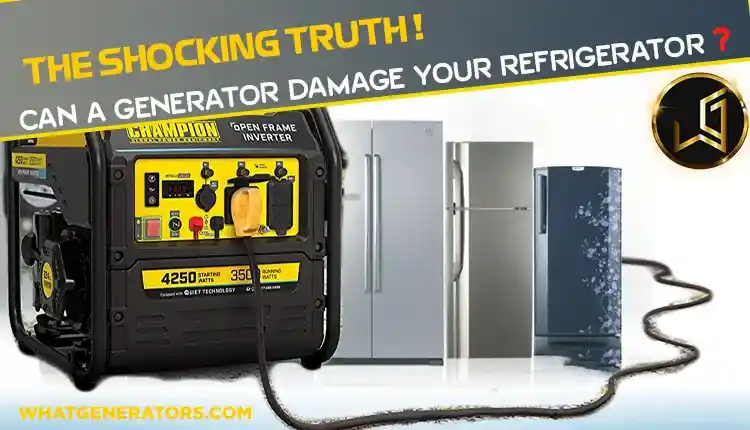
I’ve personally gone through power outages; therefore I am aware of how crucial a generator is to keep your appliances operating. But whether a generator may harm a refrigerator is a topic of much discussion.
I realized that there is more to the answer than a simple yes or no. It relies on a number of variables, including the generator’s power output, the refrigerator’s power consumption, and how the two are connected.
I’ll discuss if can a generator damage a refrigerator and offer safety advice to make sure your appliances are protected from harm when the power goes out.
What is the Best Wattage of a Generator for a Refrigerator
The ideal generator wattage for a refrigerator ranges according to the appliance’s size and power needs. A refrigerator typically needs between 500 and 750 watts to operate. To make sure that the generator can withstand any power surges or fluctuations, it is advised to use one with an output wattage that is at least 20% greater than the power needs of the refrigerator.
For example, if your refrigerator requires 600 watts to operate, it is recommended to use a generator with a wattage output of at least 720 watts.
Which Type of Generator is Best for Refrigerator? (Inverter or Traditional)
Although traditional generators can be noisy and have uneven power delivery, they are often less expensive than inverter generators. For sensitive equipment like refrigerators, which need a steady power source to function properly, this can be an issue.
On the other side, inverter generators cost more but offer a more reliable and constant power output. They are a preferable choice for use in residential areas because they are often quieter than conventional generators.
How a Refrigerator Works
Usually, when we think of a refrigerator, we picture the sizable kitchen equipment that keeps food cool. And how does it operate? A refrigerator is made up of a number of parts that work together to keep the interior of the device cool.
The compressor is a refrigerator’s key component. The refrigerant gas is compressed in this area of the refrigerator before passing through the coils at the back of the unit. The gas releases heat and turns into a liquid as it passes through the coils.
After passing through an expansion valve, the liquid refrigerant evaporative changes back into a gas. The refrigerant absorbs heat from the interior of the refrigerator during the exothermic reaction, which maintains a cool temperature.
The compressor, which is the section of the refrigerator that actually cools the air inside the appliance, and the vent, which aids in releasing heat from the refrigerant gas, are other crucial elements of a refrigerator.
Overall, a refrigerator is a complicated piece of equipment that needs a number of parts to operate together to keep the interior at a constant temperature. Knowing how a refrigerator operates helps us to comprehend how a generator that is not strong enough to sustain the refrigerator’s components could potentially harm the generator.
Is It Ok to Run a Refrigerator with a Generator
I know how important it is to have a generator to maintain a running refrigerator because I’ve experienced power outages. A refrigerator is one of these devices. However, the issue of whether using a generator to power a refrigerator is secure still stands.
My research suggests that using a generator to power a refrigerator is secure as long as the generator can provide more watts than the refrigerator requires. It’s crucial to make sure the generator can handle the initial burst of power because a refrigerator’s beginning wattage is higher than its running wattage.
According to my experience, using a generator to power a refrigerator is secure as long as the generator has a higher wattage capacity than the refrigerator’s beginning wattage. For instance, a refrigerator that requires 1000 starting watts and 600 operating watts, as well as a few other appliances with a combined wattage of 1500, requires a generator with at least 2750 watts.
It’s also critical to remember that a generator’s capacity to run a refrigerator can vary depending on its quality. The compressor in a refrigerator can be harmed by a generator with unstable voltage or frequency, so it’s critical to pick a reliable generator.
In conclusion, it is safe to use a generator to power a refrigerator as long as the generator is high-quality and has a higher wattage output than the refrigerator’s beginning wattage. By taking these measures, you may use your refrigerator during a power outage and prevent food from spoiling.
a few more precautions about not leaving the generator unattended can be also read.
Potential Risks to Refrigerators from Generators
I understand the importance of having a generator to power necessary appliances like refrigerators because I have personally experienced power outages. Yet, improper use of generators can endanger freezers as well. I will go over the possible dangers that generators can present to refrigerators in this part.
Power Surges
Power surges are one generator risk that could harm refrigerators. A power surge that results from turning on or off a generator may harm the circuit board or motor of a refrigerator. This is so that the components of the refrigerator are not damaged by an electrical overload brought on by a sudden change in voltage.
Electrical Noise
Electrical noise from generators is another potential danger to refrigerators. Electronic device performance may be impacted by electrical noise, a sort of interference. A running generator may generate electrical noise that tampers with the circuitry of the refrigerator.
Smoke by Generator
Smoke from generators inside the home might cause fatal carbon monoxide poisoning. Be sure that generators are never used in basements, garages, or other enclosed areas of buildings. They should be put outdoors, away from any doors, windows, or vents by at least 20 feet, in a well-ventilated area.
Generator smoke can damage the ecosystem and cause air pollution outside. It is crucial to pick a generator that complies with Environmental Protection Agency (EPA) emission requirements and to operate it sensibly. Emissions can be decreased with proper generator maintenance, which includes changing the oil and air filters. A generator should not be overloaded because doing so could result in it producing more smoke than is necessary.
To ensure the secure usage of generators, precautions should be followed. Reading the manufacturer’s instructions, utilizing a carbon monoxide monitor, and never replenishing the generator while it is running are some examples of this. The danger posed by generator smoke can be reduced both indoors and outdoors by following the safety recommendations.
Voltage Fluctuations
Finally, refrigerators may potentially be at risk of generating voltage variations. Voltage fluctuations happen when the generator’s output voltage varies above or below its typical operating range. This could lead to a malfunction or perhaps destroy the refrigerator’s internal parts.
Preventing Generator Damage to Refrigerators
Using a Voltage Regulator

Using a voltage regulator is one of the finest strategies to stop a generator from harming your refrigerator. The voltage of the power being produced by the generator is managed by a voltage regulator. This means that the regulator will make sure that the voltage that reaches your refrigerator is safe and steady even if the generator produces too much or too little voltage. The electrical parts of your refrigerator will be less likely to sustain harm as a result.
Grounding the Generator

Grounding the generator is a crucial step in preventing refrigerator damage from the generator. By connecting the generator to the earth, you may ground it and safeguard it from electrical surges and other potential risks. By grounding the generator, you can help to prevent your refrigerator from any potential electrical harm that the generator may cause.
Using a Surge Protector

Using a surge protector is a smart idea in addition to employing a voltage regulator and grounding the generator. Your appliances are protected by a surge protector from electrical surges that can be brought on by lightning strikes, power outages, or other electrical disturbances. You may aid in preventing harm to your refrigerator’s electrical parts and guarantee that it keeps working properly by using a surge protector.
How Long Can You Run Refrigerator with Generator?
It’s crucial to understand that even while a generator may run your refrigerator, you shouldn’t leave it running for too long. Experts advise running your generator for at least an hour in order to keep your refrigerator running for four hours. Operating your generator longer than necessary might result in unnecessary wear and tear, higher fuel usage, and risk of damage to both your generator and refrigerator.
Final Conclusion about Can a generator damage a refrigerator
I have concluded that a generator may potentially harm a refrigerator if it does not have the proper wattage after doing extensive research on the subject. Before using the generator to power the refrigerator, it is crucial to make sure it can handle the appliance’s initial watts.
Even though they are less sensitive than other electrical equipment, refrigerators always need a specific amount of wattage to function properly. In order to keep the refrigerator’s compressor from frequently turning on and off, it is essential to make sure the generator has enough electricity.
A 2000-watt inverter generator is also required for the safe operation of any device. The majority of appliances, particularly refrigerators, need 800-1200 watts to start up, and 2000–5000 watts are typically sufficient to securely power them.
In order to protect your appliances from harm when using a generator, it’s critical to observe safety precautions. These recommendations include not using a generator indoors or in an enclosed environment, utilizing a grounded extension cord, and not overloading the generator.
It is always advised to utilize an “inverter generator” for your refrigerator if you have the money.
In general, improper use of a generator could result in refrigerator damage. However, during power outages or other crises, one can securely power a refrigerator using a generator by taking the required precautions and making sure the generator has the appropriate wattage.








